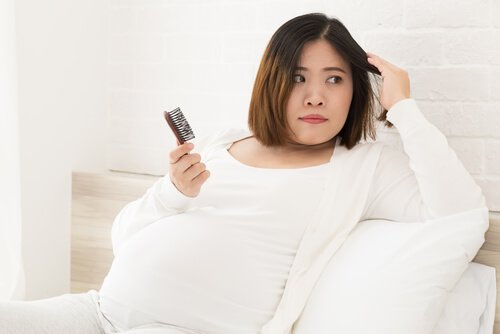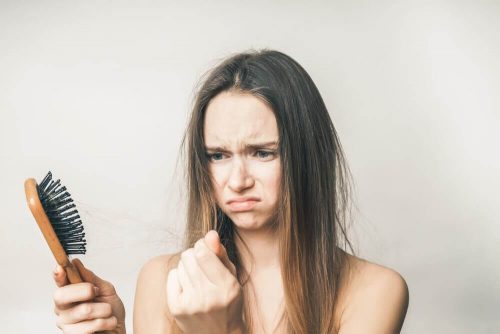What to Do About Hair Loss During Pregnancy?

Women go through numerous changes while pregnant. Some may even experience hair loss during pregnancy.
In this article we’ll explain some of the possible causes as well as ways to deal with this issue.
Possible causes of hair loss during pregnancy
Hair loss during pregnancy is frequently linked to the hormonal changes that come with this stage. Low defenses due to poor intake of essential nutrients may also be a culprit.
It’s important to remember that the requirements of the fetus are important, which means that the mother must consume sufficient quantities to meet the development needs of the baby and of her own body.
In this sense, the discomforts of the first month of pregnancy, such as vomiting and nausea, can cause a lack of appetite in the mother, and consequently, lower levels of vitamins. This can trigger hair loss, among other things.

It’s common to suffer a loss in hair volume during the postpartum period. At this time, the body is restoring the usual levels of hormones and these changes can cause it.
On the other hand, the increase in progesterone levels also promotes dry hair. As a result, it becomes more prone to breaking.
The phenomenon occurs more frequently in the last period of pregnancy. The breaking may occur at the root level and give the impression that the hair is falling out, even though the reality is different.
Hair loss during pregnancy is uncommon. However, it doesn’t mean that the mother should worry if it happens excessively. In any case, it’s always advisable to consult with your doctor to take the necessary precautions.
Steps to avoid hair loss during pregnancy
First, you have to be patient with your hair. We recommend combing it gently with a brush that doesn’t have fine bristles. In addition, it’s necessary to avoid exerting great force on it when it’s wet.
If you notice your hair is weak, it’s important to make a good selection of shampoo and conditioner. If you have normal hair, we recommend those with a neutral pH.
Here are a few other helpful recommendations:
- Nourishing masks can be applied, which have a repairing effect in case your hair is suffering extreme dryness.
- If your hair is oily, then it’s advisable to use soft shampoos for daily use.
- Hair washing should be done with warm water and gentle massages on the scalp with the fingertips.
- Avoid using hot appliances like irons and dryers. They can sometimes be used at very low temperatures to accelerate the natural drying of your hair.
- Reduce the use of very tight bows, pigtails, or braids.
- In case you decide to use hair loss prevention treatments, it’s best to consult with your doctor to receive instructions.
Some of the components in these treatments may not be recommended during pregnancy. Therefore, we’d like to stress once again the importance of consulting with your doctor before using them.

What foods help strengthen your hair?
One of the first steps to make your hair look healthy before, during, and after pregnancy is to take care of your diet. A high intake of vegetables and fruits will help strengthen hair and promote growth, in addition to protecting the hair follicles.
Also, brewer’s yeast is ideal for improving hair health and preventing its loss due to the high content of vitamin B. It can be found in dehydrated vegetables, soups, and pasta.
“Hair loss during pregnancy is frequently linked to hormonal changes.”
Likewise, green vegetables such as spinach, watercress, lettuce, or broccoli, among others, provide significant amounts of vitamin A and C. These produce segregation of sebums that help the natural hydration of hair.
Carrots, on the other hand, contain beta-carotene, which is responsible for giving it that beautiful orange color. Beta-carotene helps in the production of oils that strengthen the scalp.
Legumes such as chickpeas, beans, and other grains also make their contribution of zinc, iron, and biotin. These nutrients prevent hair breakage, strengthen the stems, and hair follicles.
Finally, the intake of omega 3 present in fish, such as sardines and tuna, contribute to the silkiness and shine of the hair. They also help strengthen the hair follicles and stimulate hair growth.
All cited sources were thoroughly reviewed by our team to ensure their quality, reliability, currency, and validity. The bibliography of this article was considered reliable and of academic or scientific accuracy.
- Alcalde Pérez MT. Caída del cabello. Offarm. 2004;23(5):108-118.
- Pedragosa, R. Alteraciones del cabello. AEPED. [En línea].